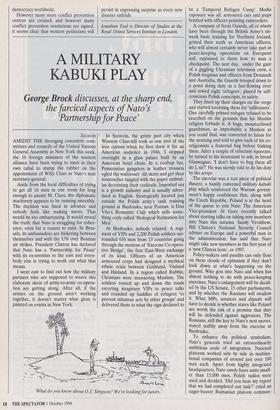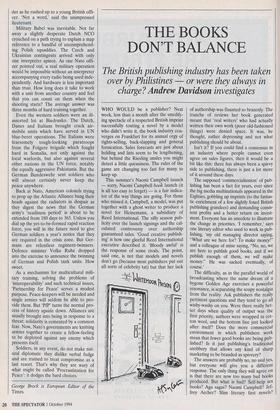A MILITARY KABUKI PLAY
George Brock discusses, at the sharp end,
the farcical aspects of Nato's `Partnership for Peace'
Szczecin AMIDST THE thronging concentric com- mittees and councils of the United Nations General Assembly in New York this week, the 16 foreign ministers of the western alliance have been trying to meet in their own cabal to stamp the rubber on the appointment of Willy Claes as Nato's next secretary-general.
Aside from the local difficulties of trying to get all 16 men in one room for long enough to anoint M. Claes, the diplomatic machinery appears to be running smoothly. The decision was fixed in advance and nobody feels like making waves. That would be too embarrassing. It would reveal the truth: that Nato is struggling for coher- ence, even for a reason to exist. In Brus- sels, its ambassadors are bickering between themselves and with the UN over Bosnian air strikes. President Clinton has declared that Nato has a 'Partnership for Peace' with its ex-enemies to the east and every- body else is trying to work out what that means.
I went east to find out how the military partners who are supposed to weave this elaborate skein of army-to-army co-opera- tion are getting along. After all, if the armies on the ground aren't working together, it doesn't matter what gloss is painted on events in New York. In Szczecin, the grimy port city which Winston Churchill took as one end of the iron curtain when he first drew it for an American audience in 1946, I stopped overnight in a glass palace built by an American hotel chain. In a rooftop bar, Pomeranian gangsters in leather trousers ogled the waitresses' slit skirts and got their moustaches tangled with the paper umbrel- las decorating their cocktails. Imported sex is a growth industry and is usually adver- tised in English. Strategically located just outside the Polish army's tank training ground at Biedrusko, near Poznan, is Don Vito's Romantic Club which sells some- thing coyly called 'Biological Relaxation for Men'.
At Biedrusko, nobody relaxed. A regi- ment of VIPs and 2,200 Polish soldiers sur- rounded 650 men from 13 countries going through the motions of 'Exercise Co-opera- tive Bridge', the first East-West exchange of its kind. Officers of an American armoured corps had designed a mythical ethnic crisis between Gothland, Vinland and Hinland. In a region called Rubble, Christians were massacring Muslims. The soldiers roared up and down the roads escorting imaginary VIPs to peace talks and rounded up huddles of refugees `to prevent inhuman acts by other groups' and delivered them to what the sign declared to `What do you know about O.J. Simpson? We're looking for jurors.' be a 'Temporal Refugee Camp'. Media exposure was all: armoured cars and jeeps bristled with officers pointing camcorders.
A company of Scots Guards, all of whom have been through the British Army's six- week basic training for Northern Ireland, gritted their teeth as American officers, who will almost certainly never take part in peace-keeping operations on European soil, explained to them how to man a checkpoint. The next day, under the gaze of a giggling Ukrainian television crew, a Polish frogman and officers from Denmark and Australia, the Guards trooped down to a pond doing duty as a fast-flowing river and rowed eight 'refugees', played by self- conscious Polish conscripts, to safety.
They lined up their charges on the verge and started screening them for 'infiltrators'. One carefully primed refugee refused to be searched on the grounds that his Muslim religion forbade it. A huge, moustachioed guardsman, as improbable a Moslem as you could find, was converted to Islam for the morning and told to give each of his co- religionists a fraternal hug before frisking them. After a couple of reluctant squeezes, he turned to his lieutenant to ask, in broad Glaswegian, 'I don't have to hug them all do I, sir?' He was sternly told to do his duty by the script.
The exercise was a vast piece of political theatre, a hastily convened military kabuki play which reinforced the Warsaw govern- ment's happy confidence that, along with the Czech Republic, Poland is at the head of the queue to join Nato. The American Vice-president Al Gore recently talked about starting talks on taking new members into Nato this autumn. Sandy Vershbow, Bill Clinton's National Security Council adviser on Europe and a powerful man in the administration, has said that Nato might take new members in the first year of a 'new Clinton term', or 1997.
Policy-makers and pundits can only float on these clouds of optimism if they don't look down at what's happening on the ground. Who gets into Nato and when has almost nothing to do with peace-keeping exercises. Nato's enlargement will be decid- ed by the US Senate, 15 other parliaments, and by whether the Russians will swallow it. What MPs, senators and deputes will have to decide is whether states like Poland are worth the risk of a promise that they will be defended against aggressors. The Russians, still the key to Nato's next moves, stayed sniffily away from the exercise at Biedrusko.
To enhance the political symbolism, Nato's generals tried an extraordinarily ambitious scale of integration. National platoons worked side by side in multina- tional companies of around just over 100 men each. Apart from highly integrated headquarters, Nato rarely fuses units small- er than 15,000 men. Polish radios were used and derided. 'Did you hear my report that we had completed our task?' cried an eager-beaver Rumanian platoon comman- der as he rushed up to a young British offi- cer. `Not a word,' said the unimpressed lieutenant.
Military Babel was inevitable. Not far away a slightly desperate Dutch NCO crouched on a path trying to explain a map reference to a handful of uncomprehend- ing Polish squaddies. The Czech and Ukrainian contingents arrived with only one interpreter apiece. As one Nato offi- cer pointed out, a real military operation would be impossible without an interpreter accompanying every radio being used inde- pendently. And hardware is less important than trust. How long does it take to work with a unit from another country and feel that you can count on them when the shooting starts? The average answer was three months of hard training together.
Even the western soldiers were an ill- assorted lot at Biedrusko. The Dutch, Danes and Italians brought crack air- mobile units which have served in UN blue-beret operations. The Italians were fearsomely tough-looking paratroops from the Folgere brigade which fought hard in Somalia, not only against the local warlords, but also against several other nations in the UN force, notably the equally aggressive Pakistanis. But the German Bundeswehr sent soldiers who will almost certainly never keep the peace anywhere.
Back at Nato, American colonels trying to prop up the Atlantic Alliance bang their heads against the radiators in despair as they digest the news that the German army's 'readiness period' is about to be extended from 180 days to 365. Unless you dial up the yet-to-be-formed rapid reaction force, you will in the future need to give German soldiers a year's notice that they are required in the crisis zone. But Ger- mans are relentless regiment-twinners. Defence minister Volke Ruhe dropped into the exercise to announce the twinning of German and Polish tank units. How sweet.
As a mechanism for multicultural mili- tary training, solving the problems of Interoperability' and such technical issues, `Partnership for Peace' serves a modest purpose. Peace-keepers will be needed and single armies will seldom be able to pro- vide them. But TfP' turns the normal pro- cess of history upside down. Alliances are usually brought into being in response to a threat; solidarity is cemented by a common fear: Now, Nato's governments are knitting armies together to create a fellow-feeling to be deployed against any enemy which presents itself.
Soldiers, in any event, do not make nat- ural diplomats: they dislike verbal fudge and are trained to treat compromise as a last resort. That's why they are wary of what might be called 'Procrastination for Peace': it dodges the hard choices.
George Brock is European Editor of the Times.



























































 Previous page
Previous page